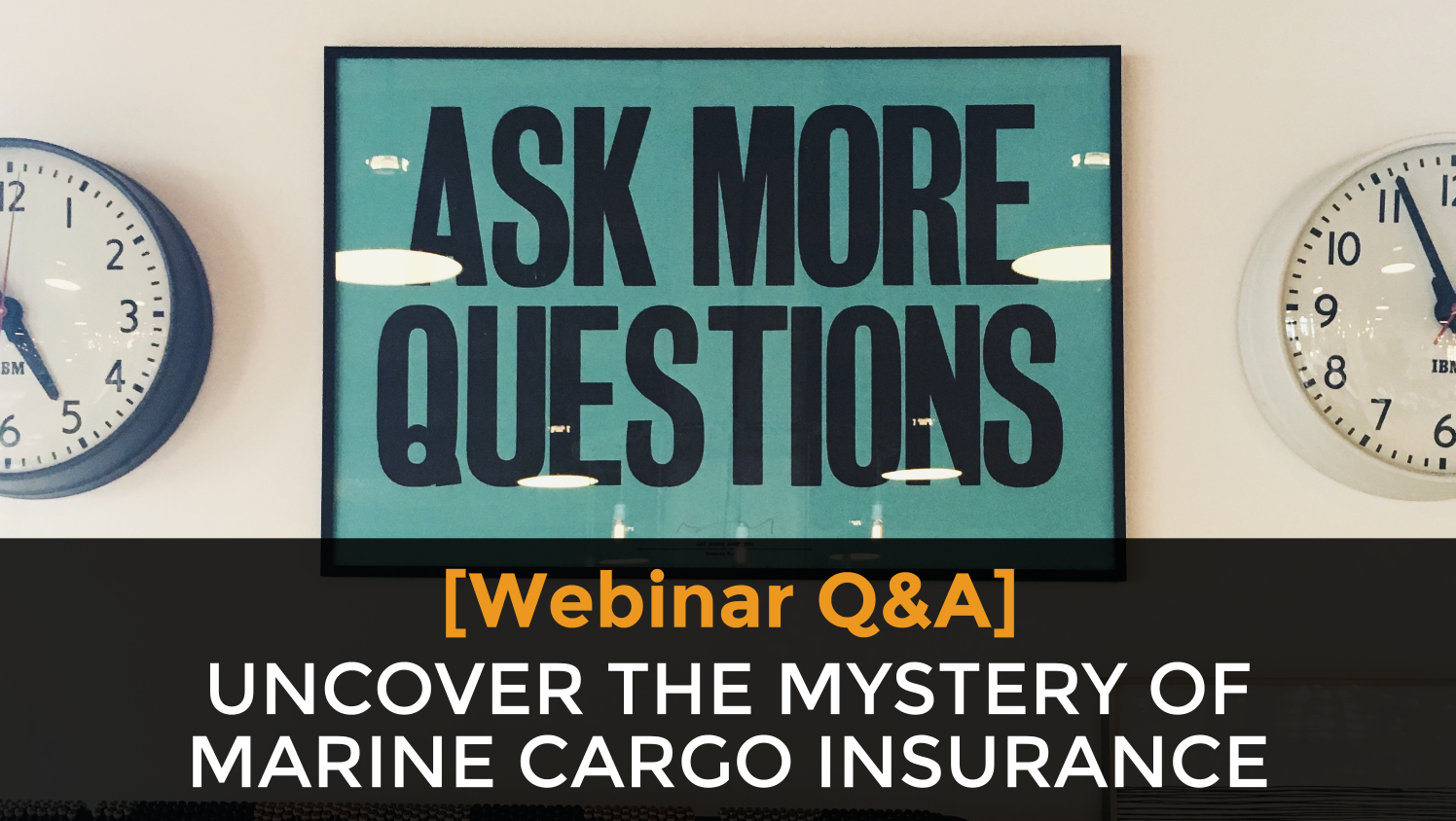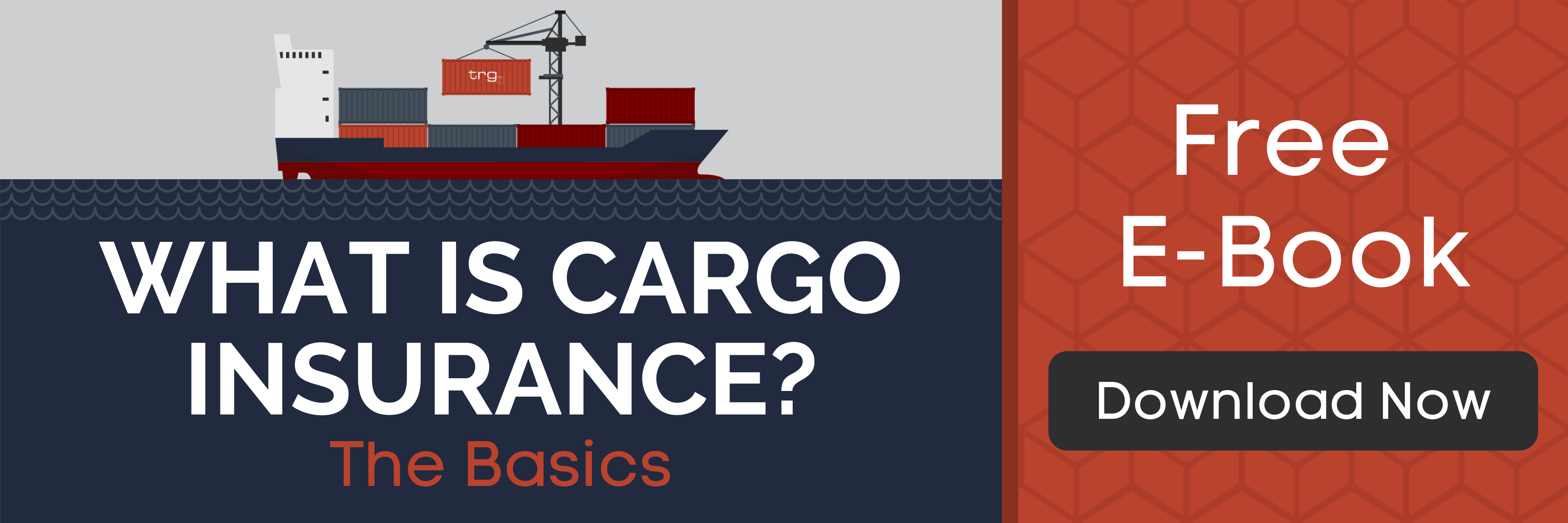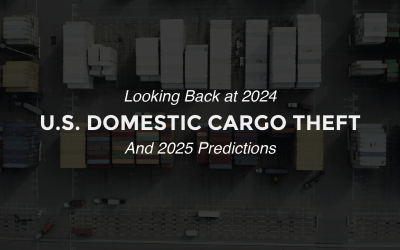TRG answers Marine Cargo Insurance questions asked during the webinar addressing how to protect your business with a Cargo Insurance policy.
This month at TRG, we held our first webinar on Cargo Insurance helping attendants “Uncover the Mystery of Marine Cargo Insurance” by ultimately outlining how to protect your business from losses during their international trade supply chain. The webinar included a chance for attendants to get their Marine Insurance questions answered directly from TRG’s National Sales and Marketing Manager, Tyler Zaichkin. The presentation covered the following topics:
- Coverage Types
- The Carrier’s Limit of Liability
- General Average
- How to Protect Your Business
Watch the Full Webinar on Marine Cargo Insurance
The video contains the full presentation with the question and answer section included in writing for your quick reference. For full transcript of the webinar, see our previous blog post about our Marine Cargo Insurance webinar.
Marine Cargo Insurance Questions and Answers
Due to recent Hanjin issue we recently found that our “All Risk” coverage excluded carrier bankruptcy. Is this a common exclusion and do carriers write policies without this exclusion?
This situation would typically be excluded under an All-Risk policy because it is loss of business or it is a business contract that went bad. This exclusion is typical of most All Risk policies throughout the country.
If a company goes bankrupt while a container is on a vessel in transit. Would the insurance help in anyway to get the cargo released or cover the cost of the business interruption?
The short answer here is no. Most Cargo Insurance policies are not in place to protect you against business-to-business relationships. They are purely property policies and that’s what they are there to protect, the property itself not loss of income due to other outside factors that could factor into the transit.
Does general average cover the cost of the ship itself should it go down? What about human asset loss?
We don’t want to cover on human asset loss because I don’t know the exact answer to that so I would rather not answer that right now. As far as the ship going down; if the ship loses power, for example, that could be considered general average loss since hiring a tug would be necessary to save the voyage. That won’t necessarily always be the case, but it could be considered general average. Typically if the ship goes down, the voyage was not saved and that is not a general average loss.
When you have a TRG policy, can you buy on a shipment-by-shipment basis?
TRG only offers Annual policies and the reason is because that’s the best way to get you the best pricing. In most cases, the more volume you have, the less cost the policy is per hundred dollars that you ship.
We look at the rate of an insurance policy exactly in that way, cents per hundred. If you buy a policy from a Customs Broker or a Freight Forwarder usually you’re going to be offered a rate of 30-60 cents per hundred dollars that you ship. However, at TRG, we aggregate all of your shipments onto one policy making it so that we are able to offer significantly reduced rates. It varies, but depending on your shipments, that could be as low as 2-3 cents per hundred dollars that you ship or as high as 15-20 cents.
Do TRG policies also cover domestic trucking?
The short answer is yes! The long answer is our policies are typically written warehouse to warehouse. What that means is that the policy coverage starts when the goods leave the foreign warehouse (or when you take ownership at the foreign warehouse) all the way until they reach their domestic destination or whatever destination that may be since it doesn’t have to be a U.S. destination.
So that entire voyage, no matter what the mode is, would be covered. It could be that the voyage goes by truck to the port in China, then is shipped to Seattle via ocean vessel, then is loaded onto a train to Chicago, and finally on a truck to south Bend. That entire connecting conveyance would be covered under a typical warehouse to warehouse policy.
However, if the goods are then unloaded in south Bend and moved individually into trucks to be moved other places throughout the country, that would be domestic coverage. The ability to purchase domestic coverage in addition to international is something we also offer with our policies.
How could we get a quote from TRG for what we move?
Getting a quote with TRG is really simple! You can contact TRG directly on our main line: 406-922-6500, you can also email Tyler Zaichkin at tyler@traderiskguaranty.com and he can help you make the next steps to obtain a quote.
The turnaround time for getting a quote is very quick. Typically, once we receive a completed application and get it off to the underwriters, we get the quote back somewhere between 24 to 48 hours. And we can bind as quick as that same day.
If the cargo ship sunk, what will be the ship insurance pay the cargo owner?
A ship sinking is a typical reason why you would want a Cargo Insurance policy. In that case, if the ship sinks due to heavy weather, the liability of the owner of the ship is very little, if any at all. So your loss would be paid out from the insurance carrier if you have a policy that covers that occurrence. Typically, a ship sinking is a covered occurrence.
Is there a difference in on-deck vs under deck coverage?
When we fill out an application with you, typically we want to know exactly how your goods are containerized. Meaning, are they in containers? Usually, the answer is yes and if they are in containers then there is no difference in the eyes of the insurer. The difference is only if they are non-containerized. If this is the case and they are not in a container, we look at the policies differently from an underwriting standpoint.
In almost ever case we are able to offer a competitive rate for those goods transported in this manner, but the policy will need to include a piece specifically stating what it does cover or doesn’t cover depending on the type of policy. Since on-deck has an increased risk it is something we typically have to add as an endorsement of the policy. While under deck does not always need that same endorsement.
What about loss of refrigeration/spoilage of cargo due to loss of power on the boat, would other shippers be liable under General Average?
That’s a tough one to cover! All exact policies are written using very specific wording so it is tough to say when something will exactly be covered and when it won’t.
Typically, for refrigerated containers (also known as reefer containers) there is a breakdown or malfunction clause that specifically talks about something happening for, in most cases, a period of 24 hours for a loss to be covered. The way that is determined is by looking at the ticker tape to see how long the instance occurred for. So it is difficult to answer is a loss would be covered in the instance that the boat loses power without looking at a specific policy and the specific timeframe of the power loss. If you would like us to look at your specific case, please contact Tyler at tyler@traderiskguaranty.com and he would be happy to answer that one-on-one.
Is shipper liable to ship damage and other cargo on the ship if his cargo is combustible and causes a fire on the ship? Does your insurance cover this loss?
If your goods are damaged due to fire and you have a Cargo Insurance Policy, typically that is going to be covered. And I say typically again because every policy is a little bit different and we want to make sure that’s fully understood. But if there is a fire, yes that is going to be covered.
When fire does get covered, the insurance company then takes over the right to that loss when they paid you out for it. That is an important note because the insurance company may go after the person whose goods exploded depending on the situation. However, that is up to the insurance carrier to decide at that point.
It is also important to remember that Cargo Insurance is only a property policy and does not provide any type of liability coverage if your goods are combustible and damage the goods of others or the ship itself.
How can we insure the container itself?
In this scenario, we are making the assumption that you physically own the container your goods are being shipped in and that you are not leasing or renting it. In that case, if you do physically own the container and you include that as part of your ownership in the policy, that could be covered under a typical policy. Again since this is a more specific situation, please contact us directly on our main line: 406-922-6500 or email Tyler Zaichkin at tyler@traderiskguaranty.com for a one-on-one answer.
Can policies be purchased now for goods currently getting loaded on a cargo ship or goods already in transit?
The answer to this is yes and no as it can be complicated to determine. If the voyage/conveyance has not yet occurred/started, then yes you can purchase a policy for goods not on the water. However, if your voyage has already started, you may not be able to since, typically, our policies commence for every voyage or conveyance that has not yet begun. So we would have to look at the terms and ask; ‘where are the goods?’, ‘who owns the goods at this point?’. But if the ownership has not transferred to you yet then a policy could be enacted for goods that have not yet hit the water.
If our buying term is CIF port, do we need to buy additional Marine Cargo Insurance?
Again, the answer is yes and no. In most cases with a CIF Incoterm your supplier is required to provide you with insurance, which is insurance on your behalf. The question then becomes ‘what are the terms of that insurance?’, ‘how are they written?’, and ‘are you fully covered and in the case of a loss are you able to fully communicate what happen and receive money?’. In a lot of cases with CIF the answer to all of these questions is no, that is not an easy thing to do when you have CIF. Often the terms are sub par and only pay you out partial losses over long periods of time.
Depending on your volume, there are a couple of ways you can do things. One is you can cancel your CIF terms and move to C&F (meaning cost and freight which cuts the insurance part out) and then purchase your own policy from a company like TRG. Or you can also buy what they essentially call a ‘supplemental insurance policy’ which would take over where your CIF terms run out.
Both of these options are available from TRG and a lot of which option is best for you depends on your volume. If you have a very high volume of imports or exports then a supplemental policy may be appropriate. However, if you have a very small amount of shipments, it may be worth more to cancel the insurance part of your agreement and instead just buy on C&F terms while purchasing your own policy separately.
What is Free of Particular Average?
Free of Particular Average (or FPA) is an old term that we don’t really use anymore. It is referring to Institute Cargo Clauses (C) which is the least amount of insurance that you can purchase for your goods. Again Institute Cargo Clauses (C) typically only covers a few amount of instances including; for ocean shipments: stranding, sinking, burning, and collision; and for air shipments: fire, lightning, crash, and collision. So that is the most restrictive coverage you can receive on your goods and is essentially only coverage for catastrophic type damages, excluding heavy weather.
If you are CIF terms, who receives the insurance payment?
The insurance policy, in most cases, is supposed to be taken out in your name as the buyer of the goods. So you would receive the payment in the event of a covered loss. We can not guarantee that in every case, but that is how the policy is supposed to work since the insurance is ultimately yours.
However, the may also be sent to the supplier after they sign an agreement to give the money to the buyer of the goods (you). Ultimately it should still end up with you, but with CIF there may be an extra step for the money to take before you receive it.






![[Webinar] How Could Changes to De Minimis Impact Your Company?](https://traderiskguaranty.com/trgpeak/wp-content/uploads/2025/05/trg-how-de-minimis-impacts-customs-bond-webinar-400x250.png)
![[Webinar] United States Reciprocal Tariffs – The What, Why, and How](https://traderiskguaranty.com/trgpeak/wp-content/uploads/2025/04/trg-webinar-reciprocal-tariffs-400x250.png)